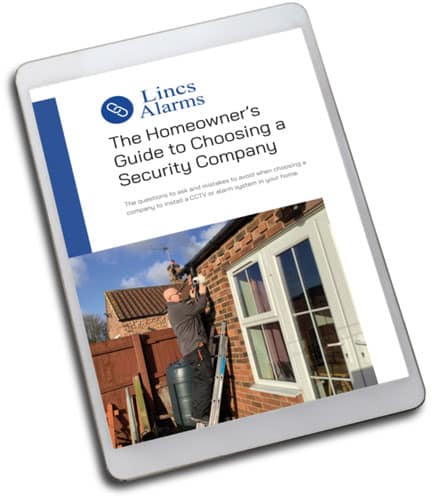Is Your Home CCTV Legal? Understanding Home CCTV Laws
Home CCTV can be a great way to protect your household as it provides constant monitoring. Whether you are present or not, CCTV can ensure that eyes are always on your home, evidence can be recorded, and criminals are deterred from targeting you.
Due to how beneficial CCTV can be as a security tool, it is becoming more popular for homeowners to rely on it. You may be considering adding security cameras to your home security system for greater protection and peace of mind. However, there are some legal considerations to make before you can install CCTV cameras.
As a leading security provider, Lincs Alarms has helped many homeowners improve the security of their houses with our installations. We offer a comprehensive domestic CCTV service, pairing homeowners with the best security systems for their needs.
Through our years of experience, we have come to understand the UK regulations and laws regarding CCTV very well. In this post, we share everything you need to know about home security laws to determine whether your home CCTV is legal and sufficient.
Is It Legal To Install CCTV At Home? Home CCTV Laws In The UK
Home CCTV has become an incredibly popular tool for people to protect their homes, families and valued possessions. There are various forms of domestic CCTV systems now available, ensuring that no matter the size of your home or budget, there is something out there for you.
As it is such a popular option, you may not have considered whether having home CCTV is legal and what the law says about such security systems.
Home CCTV is legal in the UK, but you do have some responsibilities as the homeowner to keep it this way.
The main home CCTV laws you need to become familiar with are outlined in the Data Protection Act 2018 and the UK General Data Protection Regulation (UK GDPR).
These two home CCTV laws outline how personal data, which includes images and video footage, must be handled across the UK. They play a significant role in how home CCTV can be installed and used across your premises, which is why you need to become familiar with them.
These home CCTV laws only apply in specific situations, which may impact whether CCTV can be legally used across your premises. If this is the case, then you need to understand what these home CCTV laws say about recording and how this should be handled so you can keep your home safe, legally.
Understanding Data Protection And UK GDPR
These home CCTV laws will apply to your security camera system if it captures footage outside of your private domestic boundaries. This means cameras that can record footage from:
- A public footpath or road
- A neighbour’s garden or driveway
- Shared communal areas (such as apartment entrances and main areas)
If your cameras only capture your property, such as internal CCTV cameras, then you do not have to worry about these particular home CCTV laws. When your security cameras only capture your home, you are usually exempt from these regulations through the domestic purposes exemption.
How To Keep Home CCTV Legal: Data Protection Regulations
If your home CCTV does capture areas outside of your private domestic boundaries, you have a responsibility to inform people and keep your home CCTV legal.
Under these home CCTV laws, specifically the Data Protection Act 2018, you need to:
- Inform People That CCTV Is In Use: This means having clear signs to inform visitors and passerbys that cameras are being used and their actions are being recorded.
- Limit Use of Footage: Ensure that recorded footage is only watched when required, such as following an incident or issue.
- Avoid Sharing Footage: Avoid sharing footage of surroundings on social media or with others unless required as part of an incident report
- Ensure Safe Storage of Footage: To avoid the footage being shared unnecessarily or exposed, make sure that your home CCTV systems have a secure storage facility, such as through an internal hard drive or external server.
If your camera does capture footage of public areas or those outside of your home boundaries, you need to take care to keep this footage private at all times. The main concern in terms of home CCTV laws does relate to Data Protection, but following these guidelines keeps your usage safe and legal.
Home CCTV And Neighbour Disputes: The Do’s And Don’ts
Another major concern when it comes to home CCTV laws is neighbours. Neighbourly disputes can happen over time, and CCTV may seem like a useful tool in these situations, however, this does not mean it is always legal.
The way home CCTV is installed and used can also lead to tension between neighbours, which can be easily avoided through careful consideration. To keep your neighbours happy and safe when installing CCTV at home, consider the following:
- Open Communication: It is a good idea to speak to your neighbours ahead of installation to warn them of what is happening and where the cameras will be placed.
- Use Privacy Masking Features Where Possible: Most modern CCTV systems allow for privacy masking, which allows you to block or blur certain areas of the view of the camera. This is particularly useful if your neighbour’s face will be visible to the camera or if you are facing a public area.
- Adjust Camera Angles and Zoom: To ensure your neighbours will not be monitored by your home CCTV, you can adjust the angle and control the zoom to avoid their property altogether. This can be done at any time, but it is a great idea for specific situations such as when young children are present in neighbouring homes.
Is Audio Recording Allowed In The UK?
Home CCTV cameras capture a lot more than just video footage these days, as many also come equipped with microphones for audio recording. While this can be a useful feature, it is not necessarily recommended for home CCTV.
While there are no specific home CCTV laws banning the use of audio recording in domestic settings, it is generally not recommended due to the sensitive nature of this. Unlike capturing video, recording audio is considered to be much more intrusive.
Audio recordings can capture complete conversations when people are not aware they are being recorded. This raises serious privacy concerns and falls into a legal grey area, with legal implications being raised in specific circumstances.
It is possible to use audio recording in the home if everyone is aware this is taking place. Informed consent is needed for audio recording, which is why it can cause issues if recordings are taken in public spaces or in someone else’s private property, such as your neighbours.
Secretly recording people in places where they expect privacy can cause a lot of issues and result in legal concerns. This can be a major breach of the Data Protection Act and even infringe on some Human Rights.
Due to this complication, it is generally not recommended to use audio recording as part of your home CCTV. This is why most domestic CCTV systems disable audio recording as standard and require manual input for it to be turned back on.
CCTV cameras within the home can record audio without issue, as long as occupants have informed consent. However, if your cameras face outside of your private boundaries, then it should be avoided.
Where Can I Legally Install CCTV Cameras At Home?
The primary concern regarding home CCTV laws relies on Data Protection and privacy. This means there are no specific guidelines for where CCTV cameras can be installed, but homeowners do need to be careful if the cameras face public areas or neighbouring properties.
As a general guideline, there are some common and safe places where CCTV cameras can be installed across your home, such as:
- Driveways
- Front Gardens
- Rear/Back Gardens
- Garages
Cameras can also be installed across the interior of your home to offer protection and security at all times. If audio recording is being used, make sure the family is aware of this. But as these cameras are within your private boundaries, no signage is legally required.
Any cameras that point outside of your private boundaries need to be accompanied by visible signs to inform people.
Lincs Alarms: Your Partner In Legal Home CCTV
Working with professional CCTV installers, such as Lincs Alarms, is the best way to ensure your home is being protected legally.
With our experience and industry knowledge, we understand the regulations in place for home CCTV and can ensure all cameras installed abide by these. We offer informed advice and ongoing support to homeowners to ensure they are happy and safe with their options.
Our installations are customised to suit your specific needs and designed to last. Our team can also offer ongoing servicing and maintenance to keep your home CCTV in prime condition for greater peace of mind.
Conclsuion
CCTV is a great solution for home security and is widely used to protect your household, family and valued possessions. If you are opting to use security cameras, there are some home CCTV laws that you need to be aware of to avoid legal issues.
The main concerns with home CCTV laws revolve around the Data Protection Act 2018, especially if cameras are positioned to capture footage outside of your private boundaries.
Working with professional installers like Lincs Alarms helps you avoid these issues and keeps you informed at every stage of the process so you can be safe and sound, legally.
Contact Us Today
To learn more about our services or to request a quote, reach out to the team today.

